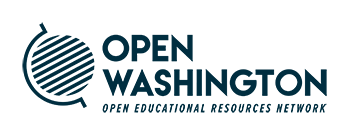81-Course Library of Free and Low-cost Educational Resources
RELEASED 10:30 a.m., April 30, 2013
Rev. 1:30 p.m.
Washington State Community and Technical Colleges Announces 81-Course Library of Free and Low-cost Educational Resources
Estimated savings already in millions
OLYMPIA, Wash. – The State Board for Community and Technical Colleges (SBCTC) today announced completion of the Open Course Library (OCL), promising to save Washington college students as a group hundreds of thousands of dollars each year. Widely acknowledged as “groundbreaking” by the higher education community, the OCL has already dramatically reduced textbook costs for students across the state. The first 42 courses were released in October 2011 and generated an estimated $1.3 million in savings. Completion of the remaining 39 courses and an updated savings estimate were officially announced during today’s media conference call.
Student savings are already stacking up. According to an analysis released today by the Student PIRGs, the Open Course Library has saved students $5.5 million to date, including $2.8 million this academic year alone. Students who take OCL courses save $96 on average versus using an expensive, traditional textbook. A 2011 analysis by the same organization found that the savings could climb to $41.6 million annually if Open Course Library materials are adopted statewide.
While college textbooks frequently cost $200 apiece, OCL course materials cost no more than $30 per course and are freely available for use by the state’s 34 public community and technical colleges, four-year colleges and universities, and anyone else in the world.
“The burden of college expenses can impact student success and degree completion. With high-quality, affordable class resources, this initiative can lead to more students graduating, “said Shaunta Hyde, State Board member and director of Global Aviation Policy for Boeing Commercial Airplanes. “For employers, it’s about increasing the skilled labor force. And for students, it’s about better job opportunities.”
Over the past two years, teams of Washington community and technical college faculty, instructional designers, librarians, accessibility specialists, and global education experts set out to arm the system’s 81 highestenrolled college courses with high-quality, low-cost educational materials including textbooks, syllabi, homework problems, and more. Subjects range from biology and math to English and U.S. history.
Use of the OCL course materials is entirely optional, but many faculty and departments have already moved to adopt —and adapt— them. Last year, the Washington State Faculty Association of Community and Technical Colleges (FACTC) passed a resolution endorsing the ideal of open educational resources on economic, educational, and moral grounds.
Funded by the Washington State Legislature and the Bill & Melinda Gates Foundation, the Open Course Library joins the growing movement for open educational resources (OER), setting a strong example by requiring that all materials created through the program be openly licensed to the public to freely use, adapt and distribute.
State Rep. Reuven Carlyle, Seattle Democrat, has been one of the state’s biggest OER champions, including the OCL initiative. “I have long challenged higher education to take the courageous approach to save students money, increase access to education, and improve the quality of educational materials through open collaboration,” said Carlyle. “The Open Course Library has been a game-changer, challenging the status quo on behalf of students, faculty, and the taxpayer.”
Carlyle said it has been especially been rewarding to see this venture expanded across the country and around the world by others building on the general ideas behind the OCL to start similar projects of their own, from Utah to California to Brazil and Poland.
David Lippman, mathematics instructor at Pierce College Fort Steilacoom in Lakewood, Wash., was a course designer for the OCL project and — along with colleague, Melonie Rasmussen — developed open resources for precalculus and other math courses. “The OCL is not just a cost-savings option for students, but allows faculty and departments greater flexibility to modify course materials to match their course outcomes,” said Lippman.
At Pierce College, the 500 students who have used Lippman and Rasmussen’s OCL text during the last two years achieved similar success rates to students enrolled in courses using traditional textbooks, but students enrolled in OCL-supported courses saved about $50,000 in total textbook costs.
During winter quarter, Tammy Questi, Pierce College Fort Steilacoom dental hygiene graduate and registered dental hygienist based in Olympia, took Lippman’s OCL-supported Math in Society as a requirement toward her bachelor of science in dental hygiene at Eastern Washington University.
“I was fearful about taking a strictly ‘on-line’ course, especially one dealing with math, since I haven’t taken a math course in over 30 years and the on-line option was very new to me,” Questi said. “The course was wellorganized with clear requirements and grading system, helpful videos to supplement the text, and responsive instructors who replied quickly.”
Tacoma Community College launched a formal open education resources (OER) project last April, inviting faculty and students to participate in the adoption of OER materials, including the Open Course Library. TCC’s Liberate $250K campaign has saved students a collective $266,000 in textbook costs since the beginning of the academic year.
“The 1,200 students who have completed OER-supported courses have been overwhelmingly supportive of the continued use of OER materials,” notes Quill West, Tacoma Community College Open Education Resources project director. “According to our winter survey, of TCC students using OER-supported courses, 97 percent would like to take more classes that use OER instead of textbooks.”
Press conference panelists were: Shaunta Hyde, State Board member, Director of Global Aviation Policy for Boeing Commercial Airplanes, The Boeing Company; Marty Brown, State Board for Community and Technical Colleges executive director; Nicole Allen, Student Public Interest Research Groups (PIRGs) textbook advocate, and a nationally recognized expert on textbook costs; Quill West, Tacoma Community College Open Education Resources project director; David Lippman, Pierce College Fort Steilacoom (Lakewood, Wash.) mathematics instructor; and Tammy Questi, Pierce College Fort Steilacoom OCL math student and dental hygiene graduate.
